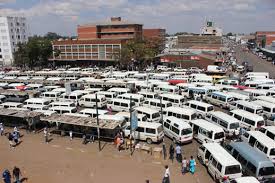
The Sunday Mail

Debra Matabvu
Government is drawing up a modern urban mass transport system worth millions of dollars with expertise and funding from the World Bank. The coming dispensation eliminates commuter omnibuses, replacing them with high-volume vehicles and new road and, possibly, rail infrastructure. The system will likely take after Tanzania, Ethiopia, Kenya and South Africa where the World Bank has helped de-congest urban roads.
Government officials will visit Tanzania and Ethiopia soon to assess their models. Dar es Salaam, Tanzania’s capital, has thirty-nine 150-seater buses and 101 others with 80-passenger capacities courtesy of World Bank support worth US$180 million. The city serves 300 000 commuters daily.
Secretary for Local Government, Public Works and National Housing, Engineer George Mlilo, told The Sunday Mail that high-volume buses would link central business districts to intra-city locations, while kombis would be restricted to inter-suburb routes until their decommissioning.
“A delegation leaves for Tanzania and Ethiopia (in early August 2016) to assess mass transport systems set up by the World Bank there. We will identify a suitable model and then engage the financier.
“Government is committed to resuscitating the reliable and affordable public transport system of the 1990s, and is, therefore, working to actualise this project. There are challenges with commuter omnibus crews that hike fares and switch routes willy nilly,” he said.
The ministry’s director of physical planning, Mrs Ethel Mlalazi, added: “Government has already engaged different players such as local authorities over the matter, and we have, through Zim-Asset, identified the system as a long-term initiative.
“The coming on board of institutions such as the World Bank will help accelerate the process as it has been on the cards for quite some time now.” University of Zimbabwe urban planning lecturer Mr Smart Dumba said it was important to get the system right as doing things wrong could literally be fatal.
“We are talking of moving large numbers of people at the same time. As such, technical feasibility studies provided by the World Bank will help determine feasibility before funds are poured into the project. Proper planning is required before investment in the project can be made. This will ensure the initiative does not fall into the same trap as Zupco.”
Traffic congestion in Zimbabwe’s major cities, especially Harare, has caused headaches to residents and authorities. The problem has been directly linked to expanding vehicle numbers, including commuter omnibuses that became the main mode of mass transport after the Zimbabwe United Passenger Company failed to cope with volumes in the 1990s.
Over 4 500 individuals are registered as kombi owners, according to the City of Harare Department of Urban Planning. However, it is understood that another 6 000 kombis operate illegally in Harare. It is estimated that over one million people use urban public transport across Zimbabwe daily.



